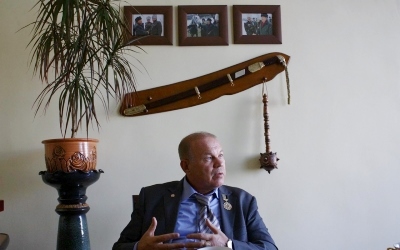
Kazakhstani Cossacks in Media Spotlight Because of Ukraine Crisis
Publication: Eurasia Daily Monitor Volume: 11 Issue: 147
By:

On August 4, the Ukrainian media widely reported on the arrest of Vladimir Mukhtarov, the major-general of Ukraine’s Cossack community. According to a statement by the prosecutor’s office of Luhansk province, Mukhtarov is suspected of having organized several “terrorist groups” near the town of Severodonetsk. These groups may have taken an active part in the ongoing war in the Donbas region where pro-Russia separatists, led by former Russian military and intelligence officers, have been fighting government troops since early April (focus.ua, intefax.com.ua, rbc.ua, August 4).
Mukhtarov’s arrest has once again raised questions about the participation of Ukrainian Cossacks in the fighting on the side of the Russia-backed rebels. Yet, this debate is not limited to either Ukraine or Russia, where hundreds of thousands of Cossacks (a quasi-military social group of predominately East Slavic peoples) have lived for many generations. The Cossacks’ courage and loyalty became legendary in the course of numerous military campaigns waged by Russian tsars as they built a vast empire in the 18th and 19th centuries. The Cossacks’ instrumental role in the conquest of the North Caucasus and Central Asia is, therefore, well known.
Kazakhstan, which in the past witnessed several waves of Russian expansionism and has since hosted a Cossack community on its territory, suddenly found itself in the media spotlight in February. At the time, the Russian daily Izvestia—known for its close ties to the Kremlin—wrote that Cossacks from eastern Kazakhstan had volunteered to join the “defenders” of Russian-speakers in the Ukraine’s east. The newspaper cited a representative of the so-called Eurasian Youth Movement as saying that Kazakhstani Cossacks had responded to calls for assistance coming from Donbas after the toppling of Viktor Yanukovych’s regime in Kyiv (Izvestia, February 25).
However, on March 3, the Kazakhstani Union of Cossack Public Associations refuted such claims. “We are not going anywhere as nobody has invited us so far. We are not preparing anything, and this issue is not even being considered,” said one of its leaders, Ivan Mikhailovsky. He further specified that the local Cossack community, including those living in eastern Kazakhstan, had not organized any collective travel to Ukraine or other places. Meanwhile, the Kazakhstani media harshly criticized any involvement of Russian entities, such as the Eurasian Youth Movement, into Kazakhstan’s domestic affairs. One article even mocked this movement by recalling its earlier support for Libya’s former dictator Muammar Qaddafi or the Serbian war criminal Radovan Karadzic (kursiv.kz, February 28; newtimes.kz, March 3).
Kazakhstani Cossacks’ deliberate attempts to distance themselves from Russia’s actions in Ukraine are understandable. In general, while having stayed loyal to the Russian empire until the Bolshevik revolution of 1917, Cossacks at all times valued their freedom and way of life over allegiance to the ruling regime. This is not entirely the case in present-day Kazakhstan, where the Cossack community is tightly embedded in the current political system centered upon President Nursultan Nazarbayev—the Leader of the Nation. Cossacks actively participate in the Assembly of Peoples of Kazakhstan, a consultative body founded in 1995. The Assembly has been chaired by Nazarbayev himself and serves to promote social concord and unity in a country that prides itself on having more than 130 peacefully co-existing ethnic groups. In May 2013, the Kazakhstani Union of Cossack Public Associations even suggested Nazarbayev as a candidate for the Nobel Peace Prize (assembly.kz, August 7).
That same month, the Kazakhstani Cossacks’ supreme ataman (leader), Yuri Zakharov, said that Russia must compensate Cossacks for the damage caused to them during tsarist and, especially, Soviet times, which he publicly called a “genocide.” Yet, this is hardly the stance of the majority of those who still identify themselves as Cossacks in Kazakhstan. Despite the existence of eight officially registered organizations representing the interests of the Cossack community, with various offices in Astana, Almaty, Shymkent and Semipalatinsk, Kazakhstani Cossacks do not constitute a clearly distinguishable ethnic group with a particular political or socioeconomic agenda (tengrinews.kz, May 23, 2013; kaz.rs.gov.ru, August 6).
The last nationwide census, conducted in 2009, does not mention Cossacks as a separate ethnicity and most likely subsumes them into wider groups of Russians and Ukrainians who account for 23.7 and 2.1 percent of the population, respectively. Thus, it is barely possible to know for sure how many Cossacks currently live throughout the country. In April 2014, Zakharov told the Kazakhstani media that there might be as many as 300,000 Cossacks. But this figure seems too high, as it is only slightly lower than the total population of ethnic Ukrainians, according to the 2009 census. What looks certain is that the majority of local Cossacks today live in Kazakhstan’s northern and eastern provinces—the same regions that hosted Cossack troops several centuries ago (stat.kz, August 6; total.kz, May 22).
Much to their credit, Kazakhstani Cossacks have never been implicated in any serious political or security scandals since Kazakhstan’s independence in 1991. The same cannot be said of some Russian public associations that occupy the radical ground in both their rhetoric and actions. In late 1999, Kazakhstan’s National Security Committee arrested several dozen members of the Russian nationalist group Rus, who had planned the complete takeover of East Kazakhstan province. Their leader, Viktor Kazimirchuk, was sentenced to 18 years in prison but was later pardoned and quickly moved to Russia in 2006. As for the Cossacks, they are no more likely to sow trouble in today’s Kazakhstan than they were in the 1990s (rusidea.org, September 30, 2006; ng.ru, November 11, 1999).




